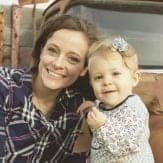Preparing for my son’s arrival, I spent a good amount of time learning and preparing to breastfeed. All of it helped immensely when it was “go time.” If it wasn’t for the fruitful breastfeeding knowledge in the back of my mind, I probably would’ve given up and quit.
Because friends, breastfeeding is no joke.
It wasn’t all that natural to me. Between you and me (and now the whole world), it was truly blood, sweat and tears for the first 7 weeks. While I was in the trenches of breastfeeding, I learned a lot about myself as a person and as a mother. We fought through it. We made it. And looking back now, I can say without a doubt that it was so totally worth it.
If you are currently breastfeeding or plan on breastfeeding in the near future, I’ve got your back. If you are struggling, I understand.
Here are 8 tips that benefited me immensely during my first month:
1. Educate yourself.
Like I mentioned above, empowering myself with breastfeeding knowledge before the baby arrived was a huge step. It does not guarantee an easy breastfeeding journey. However, it did offer me the ability to know what to expect and potentially how to fix it.
Read books.
I read two breastfeeding books: So That’s What They’re For!: The Definitive Breastfeeding Guide 3rd edition and Heading Home With Your Newborn: From Birth to Reality, 2nd Edition
(affiliate links).
The first book was all about breastfeeding. Really informative and a very laid back and casual tone throughout the book, which is something I really appreciated.
The second book Heading Home With Your Newborn is from the American Academy of Pediatrics and has a great breastfeeding section in addition to great information on formula, bottles, and everything related to initial care of a newborn. Both my husband and I read it and found it very helpful.
Reading two books gave me enough information and also provided slightly different suggestions and perspectives. I read the information and took what I liked best from each book, and I didn’t worry about the rest.
Take a class.
I was so fortunate to take a class at the Naval Hospital where I delivered my son. The lactation consultant (LLC) was incredibly funny.
Her laidback and real life approach to motherhood and breastfeeding was so refreshing. If the lactation consultant teaching your class also works at the hospital, it is a great opportunity to form a relationship with her before the birth.
I felt incredibly fortunate to have forged a relationship with my LLC before the birth. I felt so much more comfortable talking to her once I started breastfeeding and was experiencing troubles.
2. Aim for a good latch.
Taking the time to achieve a good latch was very tiring and frustrating for me in the beginning. I was so ‘Dolly Pardon’ that I’m not even sure that a good latch was all that possible.
Knowing what I know now though, I was stupid not to give it the time because I paid for it dearly.
And by paid, I mean start to create an open wound. Once I reached that point, even a good latch continued to hurt. I really did try as hard as I could to aim for a good latch, but I was tired and frustrated and my baby was crying. At the time, it seemed easier just to feed him regardless of the latch.
At any rate, I did think reading about it was really helpful, so if you are interested, all the good information about achieving a good latch is described beautifully in So That’s What They’re For!: The Definitive Breastfeeding Guide 3rd edition(affiliate link).
3. Keep reasonable expectations.
Breastfeeding is very challenging at times. It does get dramatically easier the longer you do it. Feedings get much shorter, the pain fades, and the whole experience starts to become really enjoyable. Milk supply also starts to level off around the 6-8 week mark, and I think that helps immensely as well.
Before my son was born, I prepared myself for a challenging experience. I heard from friends and family that it wasn’t a perfect process for them. It was actually encouraging to hear those stories, because when things weren’t going so great, I knew I wasn’t a failure. I knew I wasn’t the only one.
My mantra: Manage your expectations, knowing there will be ups and downs throughout your breastfeeding journey.
4. Be encouraged.
If you face challenges, know there are a lot of moms just like you in the same situation. I personally know so many moms that struggled for various reasons during the first several weeks.
I knew a mom that had to pump for two weeks and bottle feed her baby due to allergies. Her baby was allergic to traces of dairy and soy in her breast milk. She had to pump and dump to keep up her supply, while eliminating the foods from her diet. It was so encouraging to learn that she was able to resume breastfeeding.
Another mom I know came home from the hospital, and similar to me was experiencing a lot of pain. She opted to pump and bottle feed for a whole week. She too was able to resume breastfeeding.
While I’m not advocating for you to bottle feed in the early weeks, since there is a reasonable risk that your baby will not willingly return to breastfeeding. It’s important that we all know that if we find ourselves forced into this type of situation, it is still possible to have success.
5. Seek help sooner rather than later.
If you feel like something isn’t going well, getting help right away can prevent a small problem from turning into a big one. Lactation consultants are absolutely amazing. I wouldn’t skip a beat before making an appointment. Even if things are going incredibly well, a lactation can offer you support, encouragement, and validate you are doing things correctly.
For me, the LC checked my latch, offered some great advice, and helped me learn how long to feed my son. She also weighed him to ensure he was growing well. As a new mom, this was so encouraging.
6. Keep water everywhere.
Breastfeeding made me feel as if I was capable of drinking water by the gallon. Keeping water handy throughout the house was a must for me. I made it easily accessible in every area of the house where I might nurse. If I started nursing and got thirsty, it was always there.
7. Keep lots of snacks everywhere.
I was starving during the entire first month of breastfeeding. In addition to meals, I was consuming 2-3 protein bars per day. I’m not usually very big on protein bars and prefer to get protein from meats, beans, eggs, etc., but I was so incredibly hungry that I just wanted something quick and fast to take my hunger away.
8. Set small goals.
I tried to set a goal for the day or the week to encourage success. Keeping goals simple and realistic really helped. It could be something as easy as…
“Today I’m going to work on getting the baby to take a full feeding.”
“Or today I’m going to focus on achieving a good latch.”
Breastfeeding is one of the most awesome things you will ever do with your baby. It is truly such a rewarding experience. Preparing before the birth and keeping an open mind can help you prevail through the first month of breastfeeding. I wish you all the success in the world!
Want more on motherhood?
- Breastfeeding on a Schedule or Routine: Tips for Minding Your Milk Supply
- Weaning From Breastfeeding: When, How and the Emotional Truth
- My All-Time Favorite Breastfeeding Products
- 7 Practical (And Perfect) Gifts for the Breastfeeding Mom
- BEST 1 Year Old Sleep Schedules from Real Mamas
- How to Calm a 1 Year Old Tantrum Down in Minutes
I've created a free email series just for you!
If you are struggling with feeling happy in motherhood, let me help you streamline your family's daily routines so you can enjoy your family life without the stress. Yes, really. I've seen my routines work time and time again for parents. I know it can work for you too.
This free email series will help you:
- Free sample routines for your child
- Best morning routine tips and tricks your kids will actually follow
- All-time favorite parenting hacks for getting more cooperation at bedtime
- Step-by-step guide for using a printable daily schedule with kids











Lauren, I remember when I had my twins, I planned on breastfeeding. Since they were born early, they both had trouble latching. I remember crying and praying and felt sometimes like I was failing. It took what seemed like a very long time, but finally my oldest latched and was able to feed. I had a woman from La Leche come and help me, but my second never latched. I felt like a failure, but I finally had to come to terms with it. I ended up breastfeeding one and pumping for the second for 10 months. After that, I didn’t have enough milk to pump and feed. My oldest fed for longer than that, and then I had to go to formula for my second. I remember no one told me how much it would hurt, and it didn’t stop hurting for many weeks, but finally, it got easier. I felt pretty proud that I was able to do what I did. I must admit though, that I gained a little empathy for those that are unable to breastfeed. I know some moms choose not to, but I think there are some that are unable to (for one reason or another) that really want to. I think not giving up is so important, but if for some reason it doesn’t work, accepting that you love your child even if you cannot breastfeed is so important. Good post!
I truly empathize with moms with a strong desire to breastfeed, but for various reasons they are not able to. They try and try and try some more, and for several different reasons were not able to continue on. I do think we put a lot of pressure on ourselves to make breastfeeding work. This is such an important point “accepting that you love your child even if you cannot breastfeed” YES! And I totally empathize with any mom who needs to pump full time and bottle feed. Pumping and feeding is A LOT of work. There are so many moms that are incredibly strong for doing this. Thanks for your awesome feedback.
Lauren
Great tips. I remember that I was not prepared for the pain of breastfeeding. Support and encouragement is something that every new mom needs during the first few weeks to really get started and set on a good routine.
I was in pain with both my girls, although with my second I opted to use a nipple shield after the first week. I just couldn’t handle the pain and blood. I’m still using the nipple shield, which I am sure is a great thing now that she has teeth. I can tell that sometimes she is biting 🙂 My first daughter was on formula in the NICU, but after a week and a half, I was breastfeeding her. I was very adamant about it, but it definitely still hurt. I think I should have got more help with both, and then I am sure I wouldn’t have dealt with pain for as long as I did.